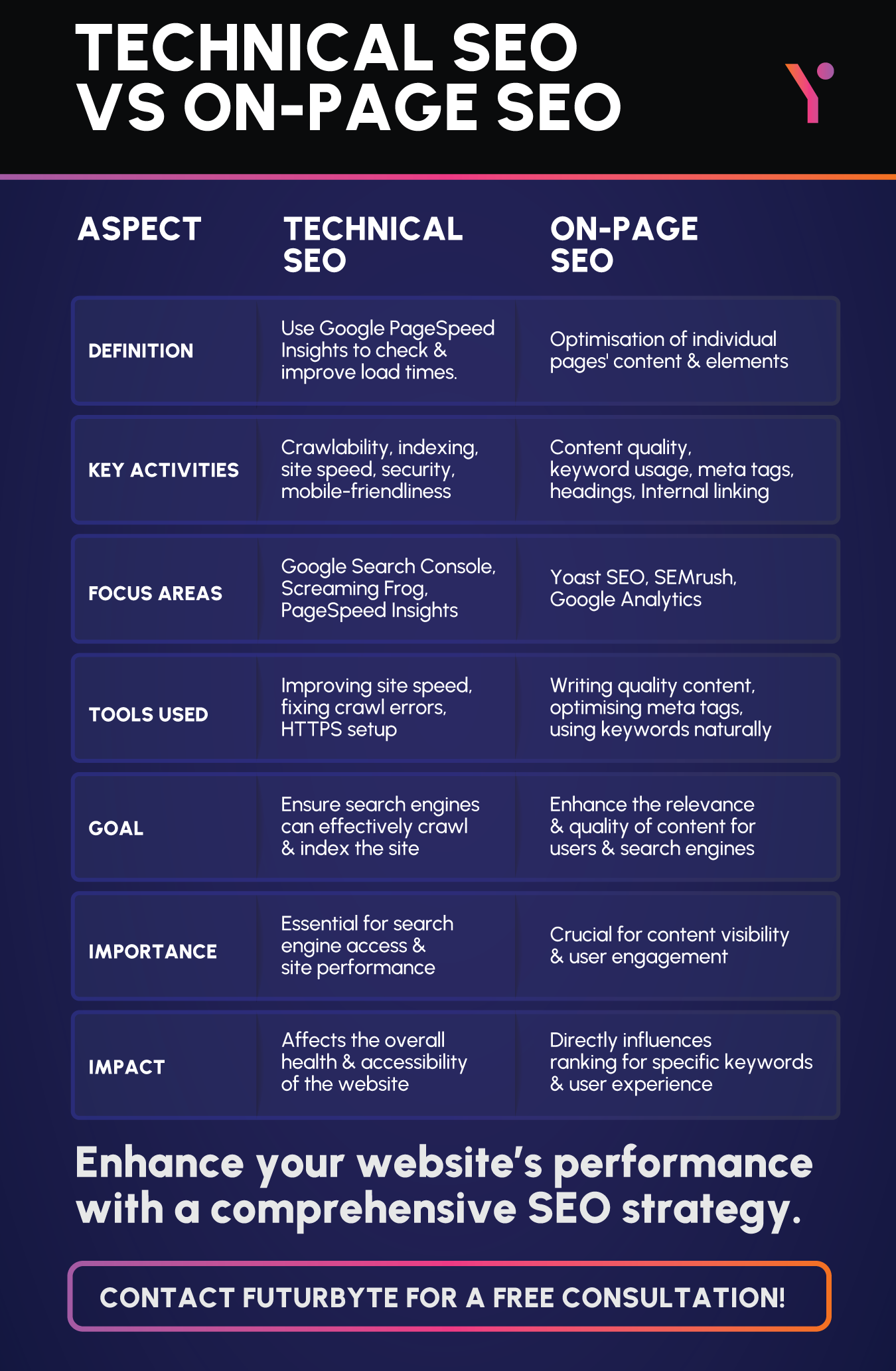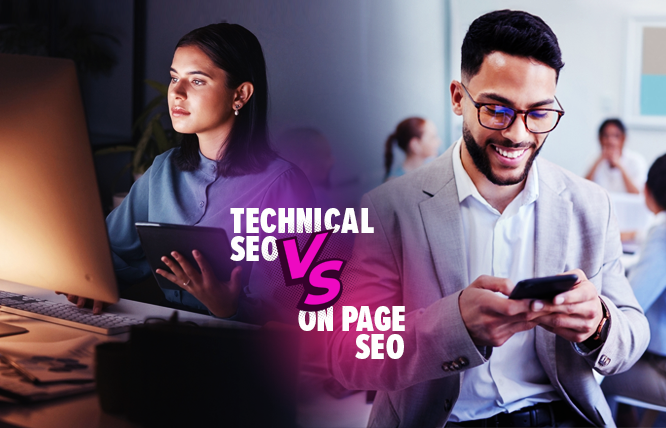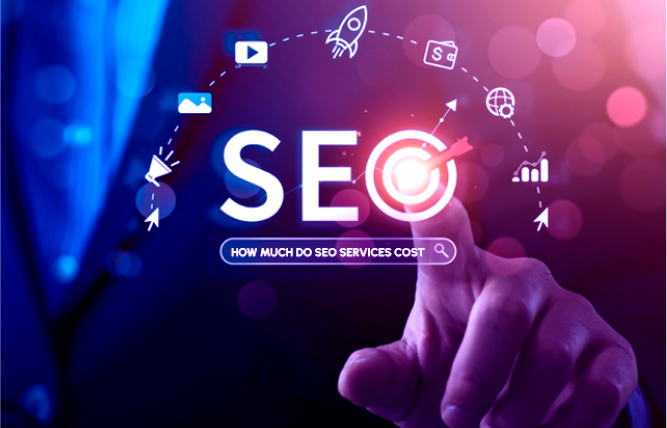Introduction
Read this guide and master your SEO efforts. Get in-depth knowledge regarding the technical SEO vs on page SEO issue. Know insights that will allow you to significantly boost your website’s search engine rankings.
Online businesses across the world are competing to gain more online visibility. Throughout this competition, search engine optimisation is your foremost weapon that allows websites to attain top ranks on search engine results pages.
Here, it is important to highlight that SEO has many faces, and two highly prominent types of SEO are Technical SEO and On Page SEO. It is seen that both of these are used interchangeably. Regardless, getting to know the difference between these two is closely related to you creating an effective and holistic SEO strategy. This point is often emphasised by those who present technical SEO services or who are engaged in the technical SEO vs on page SEO debate.

The purpose of this blog is to have a thorough look at the technical SEO vs on page SEO matter. So, here goes:
Technical SEO vs On-Page SEO: A Tabular Comparison
| Feature | Technical SEO | On-Page SEO |
Objective | Improve website performance, indexing, and crawlability | Target relevant keywords and enhance user experience. |
Focus Area | Behind-the-scenes optimisation | Content and user experience |
Benefits | Better user experience across devices, improved website health, increased website indexability and crawlability, potential ranking boost from search engines, and stronger foundation for on-page SEO efforts | Higher conversion rates, improved user engagement, improved keyword rankings, increased organic traffic, enhanced content discoverability |
Key Considerations | Structured data, security, mobile-friendliness, website speed, indexing, and crawlability | Internal linking, user experience (UX), image optimisation, meta descriptions & title tags, content optimisation |
If you need further information regarding this tabular comparison, then contact FuturByte. They are a reputed custom web development service provider that has a great idea regarding the whole on page SEO vs technical SEO debate.
Diving Deeper into Technical SEO vs On-Page SEO
Let’s look into Technical SEO first:
Technical SEO: A Powerhouse in its Own Right
Experts are of the opinion that technical SEO takes care of the unseen aspects of a website. It ensures that the website is meant for search engine crawlers so that they can effortlessly index, access, and understand your content.
The following is a very good breakdown of technical SEO’s important aspects:
Crawlability
You can consider these entities as tireless explorers whose purpose is to navigate your website. Note that technical SEO will ensure that your website’s code, structure, and robots.txt file are properly marked trails that let crawlers efficiently discover and navigate your website’s content.
This will also let search engines find your content on the on page SEO vs technical SEO topic (if there is any).
Comparison Result: It is evident here that when compared with on page SEO, technical SEO plays a more prominent role in dealing with the crawlability issue.
On a side note, if you want to get a better understanding of the “Technical SEO vs on page SEO vs off page SEO” topic, then contact FuturByte. They are a reputed web development services provider that will assist you in this matter.
Indexing
After the crawlers have discovered your content, they will proceed to add it to the search engine’s index, which is a huge library full of web pages. Understand that technical SEO goes on to optimise your website for the purpose of seamless indexing. This will ensure that your precious content is not left out and is discovered by users searching for associated terms.
Comparison Result: Again, it is evident that the technical SEO wins here since if there is no proper indexing, a website’s content will not be visible in search results. This one point alone has been acknowledged by many who argue about technical SEO vs on page SEO.
Website Speed
Quick load times are more than just a user experience (UX) concern. They are, in fact, a critical technical SEO factor. Technical SEO uses a host of strategies, such as code minification and image compression. The purpose here is to make your site extremely fast.
Comparison Result: It can be seen that both on-page SEO and technical SEO contribute to UX. Still, if we have to give one a bit of an edge, it has to be technical SEO.
Mobile-Friendliness
We are living in a mobile-dominant world. This means that if your website is not mobile-friendly, it is almost like a store that is full of goods but has a “Closed” sign placed on it. This is where technical SEO comes in to ensure that your website presents a seamless experience on every device, such as smartphones, tablets, and desktops.
Comparison Result: With regards to technical SEO vs on page SEO, this is one place where technical SEO takes centre stage since mobile-friendliness is a vital technical aspect.
Security
Search engines are known to prioritise secure websites to protect user data. Here, technical SEO comes into play as it ensures that a given website makes use of a valid SSL/TLS certificate for the purpose of secure communication.
Comparison Result: With regards to technical SEO vs on page SEO, technical SEO takes the lead here since security is considered to be a foundational technical aspect.
On-Page SEO: Putting the Spotlight on Content
Ask any On-page technical SEO expert or someone who has debated on the technical SEO vs on page SEO issue. You will most likely confirm that on-page SEO shines the spotlight on the content and elements that face a direct interaction from the users on a website.
The following is a rather detailed breakdown of how on-page SEO forges a search-engine-friendly and user-friendly experience:
Contenet Optimisation
It is in the nature of on-page optimisation to prioritise the creation of informative and high-quality content that can accurately resonate with a given target audience and is able to strategically incorporate the relevant keywords.
This may involve the creation of product descriptions, blog posts, or service pages that are optimised for search engines and are engaging for the users.
Comparison Result: While both on-page SEO and technical SEO have keywords in them, it is the on-page SEO that takes the lead here. This is because of its focus on keyword integration within the content.
Meta Descriptions and Title Tags
If you don’t know what meta descriptions are, then note that they are basically concise summaries. They appear in search results. When we look at title tags, they are clickable headlines present on your webpage.
The on-page SEO puts focus on the creation of informative and compelling meta descriptions and title tags that are able to accurately reflect your content. At the same time, the SEO strategically targets the relevant keywords.
Comparison Result: It is the on-page SEO that takes the lead here, as the discussed elements influence how a website shows in search results. If there are compelling meta descriptions, then they will better appeal to the viewers to click on the website. Furthermore, the informative title tags can precisely represent your content, thereby exerting influence on search engine rankings.
Image Optimisation
Almost everyone who discusses the technical SEO vs on page SEO issue understands that images have the power to boost user experience. On-page SEO practices can optimise image file sizes by utilising descriptive alt text and including relevant keywords in filenames.
Comparison Result: We see that technical SEO may ensure that images load rapidly; it is the on-page SEO that goes on to optimise images for both search engines and user experience. This includes making use of alt text that rightfully narrates the image content and naturally incorporates the associated keywords.
User Experience (UX)
Generally speaking, the on-page SEO practices go on to prioritise the creation of a user-friendly experience. This is done by ensuring that there is a logical website structure, clear navigation, and quick loading times. This features elements such as internal linking that lets users effortlessly navigate between various pages on a website.
Comparison Result: Both the on-page SEO and technical SEO do a very effective collaboration here. It is the responsibility of technical SEO to ensure that there are fast loading times, and that of on-page SEO is to ensure there is clear navigation via internal linking.
Internal Linking
The process of internal linking involves the creation of connections between various pages on a given website. A robust and reliable on-page SEO strategically utilises internal linking to improve the overall user experience, website navigation and to distribute link equity across the website. This will indirectly affect search engine rankings, and this point is commonly appreciated by both sides in a technical SEO vs on page SEO debate.
Comparison Result: It is true that both on-page SEO and technical SEO may involve internal linking; on-page SEO shows more prominence when it comes to strategising which pages to link and the manner of linking.
Do you want further information as to how internal linking can do wonders for your website? Contact FuturByte today. They are a reputed fintech software development company that enjoys a globally situated client base.
The Unique Synergy: Technical and On-Page SEO Working Together
Consider this – there is a well-crafted home that is made on unstable foundations. This is what a website is that is powered by great on-page SEO but has not-so-optimal technical SEO. On the flip side, if there is a website that has a robust technical foundation but unoptimised or bland content, then this is comparable to a robust house with no interior.
When on-page and technical SEO work in tandem, they can make a website that is user-friendly as well as technically sound. This will lead towards optimal search engine visibility.
The following are some great examples of how both on-page SEO and technical SEO collaborate with each other:
User Engagement and Fast Loading Speed
Technical SEO can optimise website speed. This will boost not just the ranking but also the user experience. When users are able to quickly access content, they are more likely to be on the website for exploration purposes. This goes on to send positive signals, especially to the leading search engines.
Keyword Rankings and Title Tags
The focus of on-page SEO is on the optimisation of title tags with all the relevant keywords. If there is a technically sound website, it will ensure that the title tags are appropriately indexed by search engines. This will possibly influence keyword rankings for those terms.
Do you want to know more about keyword rankings and title tags? Simply contact FuturByte. They are a reputed PWA development company that will assist you on the matter.
Local SEO and Mobile-Friendly Design
The right technical SEO practices will pave the way for a mobile-friendly website. This is very important for local SEO as it allows users to rather effortlessly find and then engage with a given local business. This will benefit both the local search rankings and the user experience.
The Takeaway
Sure, we can do a comparison regarding the various aspects of both technical SEO and on-page SEO. We can also debate hours and hours regarding the technical SEO vs on page SEO issue. However, we must understand that neither of these is actually a competitor to the other. On the contrary, it is safe to assume that they are partners as they can drive a successful SEO.
As a company, if you are able to emphasise both, then this will let you make a website that search engines can easily index, crawl, and thoroughly understand while also presenting users with an engaging and seamless experience.
It is this combined effort that goes on to boost a website to some of the highest rankings of search results. This will drive organic traffic and help you attain your SEO objectives.
Concluding Remarks
We can go to many lengths while discussing the technical SEO vs on page SEO issue. If you are interested in getting to know further details about the technical SEO vs on page SEO topic, then contact FuturByte today. They come as a reputed WordPress development company that can increase SEO traffic with WordPress and enjoy a globally-situated client base. They will give you great advice on the matter.
Frequently Asked Questions
Many individuals who debate regarding technical SEO vs on page SEO don’t know about the significance of on-page SEO. Well, on-page SEO aids search engines to better understand your website’s content and allows users to easily navigate it.This lets you offer a more positive user experience.
Technical SEO makes sure that there is a mobile-friendly and quick-paced website that has a clear structure. This assists search engines in getting a better understanding of your content and increases the likelihood of ranking for voice search queries that are phrased as questions.
Prior to migration, you need to thoroughly plan redirects and conduct SEO audits. During migration, you have to transfer the complete data and also update internal links. Then, keep checking for issues and make sure that backlinks are pointing towards your site.
This question is often inquired by those interested in the technical SEO vs on page SEO debate. The fact is that temporary SEO fluctuations, content removal, crawl errors, mobile-friendliness issues, and broken backlinks could be responsible here. Make sure that you look deep into all such factors to identify the key cause.
This point is generally the interest of those who are into the technical SEO vs on page SEO issue. Note that crawling errors happen when search engines face trouble accessing your website. This can negatively impact your SEO, waste crawl budget, and prevent indexing.
Yes, you can perform basic-level SEO for your WordPress site without plugins. This is how you can do it:Optimise titles & descriptionsPerform keyword researchPerform internal linkingGo with a mobile-friendly designGo with high-quality contentMake sure that you include these points in your WordPress SEO checklist.
Have questions or feedback?
Get in touch with us and we‘l get back to you and help as soon as we can!



